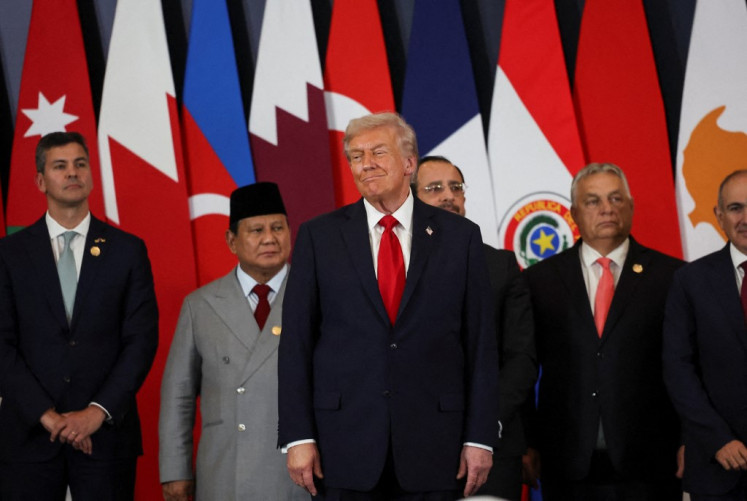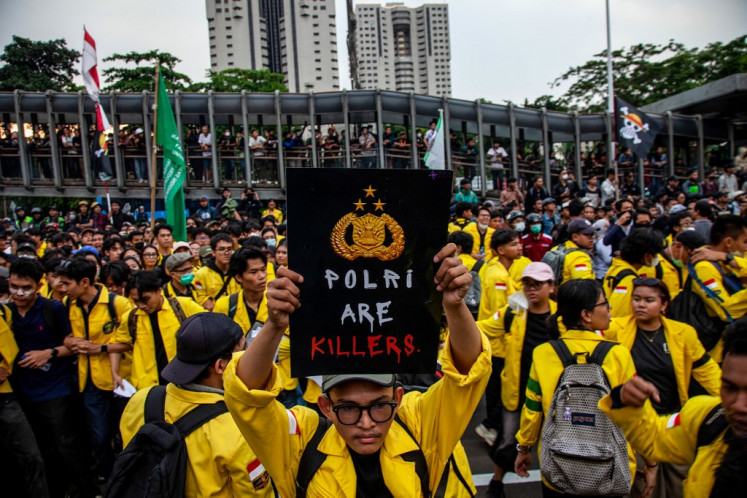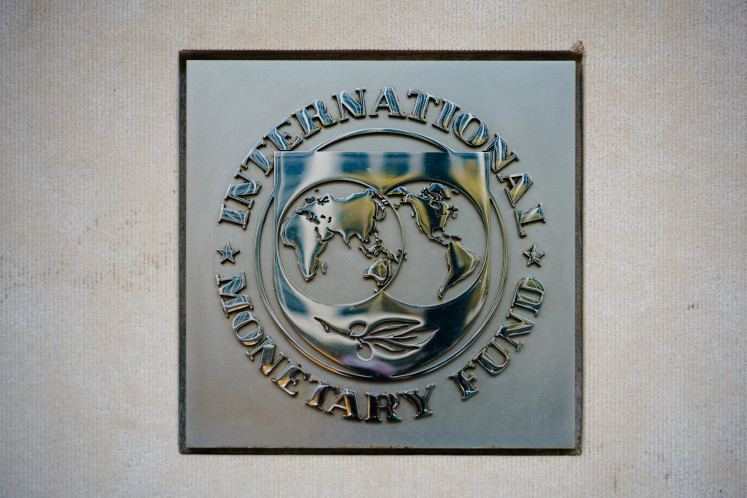Popular Reads
Top Results
Can't find what you're looking for?
View all search resultsPopular Reads
Top Results
Can't find what you're looking for?
View all search resultsIndonesia’s elections too expensive
There are many reasons to admire Indonesia for its 2019 elections
Change text size
Gift Premium Articles
to Anyone
T
here are many reasons to admire Indonesia for its 2019 elections. These elections were the largest one-day elections in the world. Despite some glitches and disputes, the elections went relatively well. These elections showed that support for democracy is strong in Indonesia.
Yet these elections also generated debate about whether Indonesia’s electoral system needs reforms. The immediate spark were the deaths of over 600 volunteers who organized the voting in polling stations.
Most of them died of exhaustion owing to the complex challenge of overseeing the simultaneous elections. This sparked discussion about whether these elections should be held simultaneously and whether electronic voting should be implemented.
There is a long history of tinkering with Indonesia’s electoral system. To name just a few of the most important reforms: the adoption of direct elections for president in 2004 and regional heads in 2005, the shift from an open to a closed list as a manner of allocating legislative seats in 2009 and the gradual raising of the threshold for a party to gain a legislative seat to currently 4 percent.
Regular reforms are not necessarily a bad thing: it makes sense to learn from experience, particularly for a new democracy like Indonesia’s. Yet these reform attempts have left an important problem off the agenda.
So far these reforms have not focused on reducing the costs of election campaigns. They focused on other goals, such as curtailing the number of parties. As a result, these reforms have actually increased the costs of election campaigns.
Over the last six years I studied Indonesia’s elections for a book that I recently published together with Edward Aspinall, entitled Democracy for Sale: Elections, Clientelism and the State in Indonesia.
We found that these campaign costs have now reached a level that seriously affects the quality of both Indonesia’s government and its democracy.
Electoral reforms should also attempt to reduce the role of money in Indonesia’s democracy.
The problems posed by Indonesia’s high-cost elections are becoming increasingly obvious, also to politicians themselves. I came across many politicians who, like “Syarif” — a candidate for deputy mayor in Tangerang, Banten — complain about the contradictory challenges they face: “People tell us, you cannot be corrupt, you have to be clean.
But on the other hand, they always ask us for money, without thinking about how the leader will get the money. And if the leader gets the money from forbidden areas, they will be angry.”
Syarif nicely summed up the impossible situation in which many politicians find themselves. On the one hand, politicians need to be willing and able to hand out money and gifts. Vote-buying has become widespread, particularly in local legislative and regional head elections.
In the book Vote Buying in Indonesia, political scientist Burhanuddin Muhtadi used opinion polls to estimate that about 33 percent of all Indonesian voters experienced vote-buying in 2014 — a figure that ranks Indonesia among the highest in the world. He also found that this practice was rapidly intensifying.
And vote-buying is merely one of many campaign expenses. Politicians generally also have to pay a hefty mahar politik or the payment candidates make to political parties to get their support.
And then politicians have to spend money to build a tim sukses to organize campaign events and pay for witnesses at polling booths.
For our book, we asked more than 500 political experts from across Indonesia to give an estimate of campaign expenditures. With considerable regional variation, they estimated that, on average, a winning regional head spends about Rp 28 billion (US$2 million), and an elected governor about Rp 166 billion.
This money needs to be recovered. As Syarif implicitly acknowledged, in these circumstances it is very difficult for politicians to avoid stealing state money.
The high costs of election campaigns are fueling corruption and, as a consequence, limit the budgets available for improving public services, welfare, infrastructure etc. High costs elections not only ensure that many politicians end up in jail but they also damage the quality of life of ordinary Indonesians.
A second negative effect of the high-cost of elections is that it leads to political inequality: if you do not have a lot of money or rich backers, you stand little chance of winning elections.
This is why Indonesia’s democracy is often tainted as being oligarchic: the high costs of elections enable economic elites to dominate politics.
A third reason to worry about campaign costs is that it fuels disillusionment with democracy. Politics risks being seen as an affair for greedy, corrupt people.
A vicious circle is currently at work: as people consider their politicians to be corrupt, they demand more vote-buying during elections, which in turn forces politicians to become even more corrupt.
Election campaigns do not have to be so extravagantly expensive. Yes, vote- buying has its roots in cultural and economic conditions. These cannot be changed easily or quickly. But the current high-costs elections also have their roots in Indonesia’s electoral system.
A consensus is growing, for example, that the decision of the Constitutional Court in 2009 to use an open list proportional voting system for legislative elections greatly intensified vote-buying. Under this system, legislative seats are not allocated on the basis of the position of a candidate on a party list of candidates (as in a “closed list system”) but purely on the number of votes a candidate receives.
While well intentioned, the effect of this reform has been that candidates of the same party are now competing among themselves. Candidates from the same party are trying to outspend each other.
A second problem with Indonesia’s electoral system is that it weakens political parties in significant ways. The candidate-centered nature of the electoral system forces candidates to run personal campaigns rather than engaging in party-led, collaborative efforts — something that could reduce campaign costs.
Furthermore, the Elections Supervisory Agency (Bawaslu) is relatively powerless to catch and prosecute vote-buying practices. With a stronger legal mandate, Bawaslu could become more effective in deterring politicians from handing out money.
These are just three examples of how changes in the electoral system might curtail campaign costs. By addressing these issues, electoral reform could reduce the role of money in elections to healthier proportions.
These issues are complex and changing the electoral system could have all sorts of unintended consequences. It would require a careful and thoughtful process, a process that should build on a detailed understanding of the incentive structure that politicians currently face.
However such an effort to reduce the role of money is well worth the effort. Achieving lower-cost elections would be a very big victory: Cheaper election campaigns could lead to lower levels of corruption, higher budgets to improve public services and a healthier democracy with equal opportunities for rich and poor candidates alike. That deserves to be at the top of the agenda.
_________________________
The writer is a senior researcher at KITLV Leiden, the Netherlands, researching local democracy, clientelism and identity politics in India and Indonesia. He coauthored Democracy for Sale: Elections, Clientelism and the State in Indonesia with Edward Aspinall.










